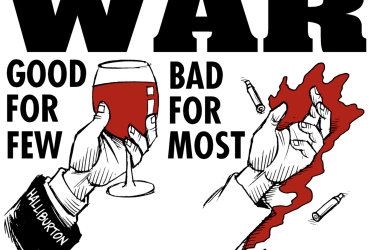By Gabriel Kuhn
A review of Dan Glazebrook’s Divide and Ruin: The West’s Imperial Strategy in an Age of Crisis. Originally published on AAP.
Dan Glazebrook’s Divide and Ruin: The West’s Imperial Strategy in an Age of Crisis appeared already in 2013. We decided to review it in the context of our recent focus on antiimperialist politics. Apart from several reviews of publications dealing with the subject, this also includes the text “Oppressor and Oppressed Nations: Sketching a Taxonomy of Imperialism”, published by Kersplebedeb.
Glazebrook’s book is a collection of writings that appeared between 2009 and 2013 in various forms and outlets. It contains a leaflet for an Occupy protest as much as articles for the Guardian and the Independent. In his introduction, Glazebrook expresses the hope that “I have chosen and arranged them [the writings] in a way that works as a (more or less!) coherent whole” (p. x).
This is at least partly fulfilled. The contributions are too diverse to create a narrative, but they are cohesive enough to outline and clarify Glazebrook’s two main theses: 1. The imperialist powers increasingly rely on proxy wars to further their interests rather than on direct military intervention. 2. Creating failed states has taken priority over creating reliable allies.
The second thesis seems more intriguing. Proxy wars have regularly been used by imperialist powers, depending on military potential, geopolitical conditions, and the level of support for imperialist policies at home. But the attempt to destabilize regions rather than to install puppet regimes is a new approach. Glazebrook explains this with the growing economic power of certain Third World countries (particularly China), which causes Western imperialists to weaken possible allies in the Third World rather than running the risk of losing their loyalty and have them support challengers to their rule.
Divide and Ruin is an important contribution to contemporary discussions about antiimperialism. However, it also suffers from problems characteristic for a certain strain of antiimperialist politics: the evaluation of Third World regimes opposed to Western imperialism becomes murky. Do rulers such as Assad preside over progressive regimes only because they don’t (at least not in every respect) serve Western interests? Is our enemy’s enemy our friend? Can antiimperialist politics consist of authoritarian regimes struggling over global influence?
In fairness, addressing such questions might be beyond the scope of what a book like Divide and Ruin can and wants to do. Its strength lies in the analysis of how Western imperialism functions today. In its final chapters, it also has some great advice for activists in the imperialist countries. With regard to the England Riots of 2011, Glazebrook writes:
“With their so-called ‘mindless looting’, the dispossessed youth are in fact carrying out a primitive form of wealth redistribution. What they are doing in a disorganised and spontaneous way, is precisely what we should be doing in a systematic and disciplined way. … We need to step up and provide leadership and organisation, and until we do that – our criticisms of the youth are hollow and deceitful. If we leave it to the children to bring accountability to policing and to redistribute wealth, without any leadership or guidance, we shouldn’t be surprised if they do a messy job.” (p. 127)
This needs to be taken to heart if we want to create movements that challenge the imperialist order by shaking its foundations in the imperialist countries themselves.
(August 2017)
More blogs from Gabriel | Back to Gabriel Kuhn’s Author Page






